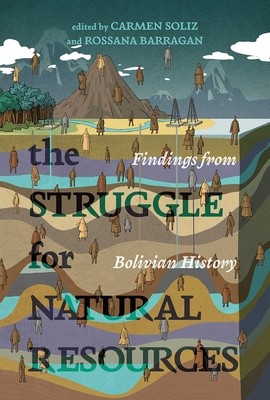
- We will send in 10–14 business days.
- Publisher: University of New Mexico Press
- ISBN-10: 0826366171
- ISBN-13: 9780826366177
- Format: 15.2 x 22.9 x 1.9 cm, softcover
- Language: English
- SAVE -10% with code: EXTRA
The Struggle for Natural Resources (e-book) (used book) | bookbook.eu
Reviews
Description
The Struggle for Natural Resources traces the troubled history of Bolivia's land and commodity disputes across five centuries, combining local, regional, national, and transnational scales. Enriched by the extractivism and commodity frontiers approaches to world history, the book treats Bolivia's political struggles over natural resources as long-term processes that outlast immediate political events. Exploration of the Bolivian case invites dialogue and comparison with other parts of the world, particularly regions and countries of the so-called Global South.
The book begins by examining three Bolivian resources at the center of political dispute since the early colonial period, namely land, water, and minerals. Carmen Soliz, Rossana Barragán, and Sarah Hines show that, as in the colonial and early republican past, these resources have remained the focus of political contention to the present day. Until the end of the nineteenth century, Bolivia's battle over natural resources was primarily concentrated in the highlands and inter-Andean valleys. Beginning in the 1860s, the bicycle and soon the automobile industries triggered demand for natural rubber found in the heart of the Amazon. José Orsag analyzes the impact of this extractive economy at the turn of the twentieth century. The book concludes by examining two resources that are central to understanding the last century of Bolivia's history. Kevin Young examines the fraught business of hydrocarbons, and Thomas Grisaffi analyzes the coca/cocaine circuit. Each chapter studies the social dynamics and political conflicts that shaped the processes of extraction, exchange, and ownership of each of these resources
EXTRA 10 % discount with code: EXTRA
The promotion ends in 20d.18:21:18
The discount code is valid when purchasing from 10 €. Discounts do not stack.
- Publisher: University of New Mexico Press
- ISBN-10: 0826366171
- ISBN-13: 9780826366177
- Format: 15.2 x 22.9 x 1.9 cm, softcover
- Language: English English
The Struggle for Natural Resources traces the troubled history of Bolivia's land and commodity disputes across five centuries, combining local, regional, national, and transnational scales. Enriched by the extractivism and commodity frontiers approaches to world history, the book treats Bolivia's political struggles over natural resources as long-term processes that outlast immediate political events. Exploration of the Bolivian case invites dialogue and comparison with other parts of the world, particularly regions and countries of the so-called Global South.
The book begins by examining three Bolivian resources at the center of political dispute since the early colonial period, namely land, water, and minerals. Carmen Soliz, Rossana Barragán, and Sarah Hines show that, as in the colonial and early republican past, these resources have remained the focus of political contention to the present day. Until the end of the nineteenth century, Bolivia's battle over natural resources was primarily concentrated in the highlands and inter-Andean valleys. Beginning in the 1860s, the bicycle and soon the automobile industries triggered demand for natural rubber found in the heart of the Amazon. José Orsag analyzes the impact of this extractive economy at the turn of the twentieth century. The book concludes by examining two resources that are central to understanding the last century of Bolivia's history. Kevin Young examines the fraught business of hydrocarbons, and Thomas Grisaffi analyzes the coca/cocaine circuit. Each chapter studies the social dynamics and political conflicts that shaped the processes of extraction, exchange, and ownership of each of these resources


Reviews